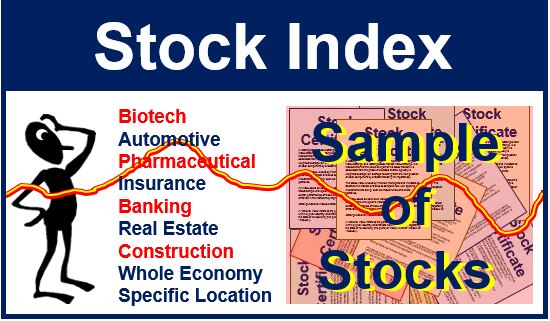Introduction
In the realm of modern finance, two prominent entities dominate the investment landscape, each offering unique mechanics and opportunities for wealth creation: stocks and indices.

Image: marketbusinessnews.com
Whether you’re a novice investor or a seasoned portfolio manager, understanding the distinctions between these two avatars is essential for effective asset allocation and strategic market navigation. Join us as we delve into the fascinating world of stocks and indices, exploring their historical origins, intricate workings, and implications for investors of all stripes.
Stocks: Individual Stars in the Investment Galaxy
Stocks, also known as shares or equities, represent fractional ownership in a publicly traded company. When you purchase a stock, you acquire a tiny portion of that company and gain an entitlement to its future profits, which may materialize in the form of dividends or capital appreciation (or, in some cases, both).
The stock market serves as a vibrant marketplace where investors can buy and sell shares of these companies, hoping to profit from price fluctuations driven by market forces and corporate performance. The New York Stock Exchange (NYSE) and NASDAQ are among the most famous stock exchanges in the world.
Types of Stocks
- Common Stocks: The most widely held type of stock, common shares typically carry voting rights and receive dividends issued by the company.
- Preferred Stocks: Preferred shares usually lack voting rights but offer a fixed dividend, which must be paid out before dividends can be granted to common shareholders.
Indices: Reflecting the Economy’s Shifting Tides
Unlike stocks, which represent individual companies, indices monitor a group of stocks that share common characteristics. These collections can be based on industry, size, geographical location, or any other relevant criteria.
Indices act as barometers, reflecting the collective performance of the companies within their domain. They provide investors with a valuable snapshot of the overall market or a particular segment of it, making them indispensable tools for performance tracking and investment decision-making.

Image: navi.com
Popular Indices
- Dow Jones Industrial Average (DJIA): A time-honored index consisting of 30 prominent blue-chip companies, the DJIA offers a glimpse into the health of the American industrial sector.
- S&P 500: Measuring the stock market performance of 500 large-cap U.S. companies, the S&P 500 is widely regarded as a benchmark for the overall U.S. equity market.
- NASDAQ Composite: This index tracks the performance of over 3,000 stocks listed on the NASDAQ exchange, predominantly representing the technology and biotech sectors.
Comparing Stocks and Indices: A Closer Examination
By now, you have a clearer understanding of what stocks and indices represent. Let’s delve into their key differences, exploring the unique advantages and risks they present.
Risk and Returns
Stocks:< Strong> Stocks tend to exhibit higher volatility compared to indices, as their value is influenced by a single company’s fortunes and misfortunes. This heightened risk potential, however, is often accompanied by the prospect of greater returns.
Indices: Due to their diversification, indices generally carry lower risk than individual stocks, as the performance of any single company has a reduced impact on their overall value. Consequently, returns on indices tend to be more moderate.
Investment Considerations
Stocks:< Strong> Choosing the right stocks for your portfolio requires research. You should carefully evaluate companies’ financial health, industry outlook, and management track record before investing in their shares.
Indices: Investing in indices offers a convenient way to gain broad market exposure with reduced stock-specific risk. You can choose indices that align with your investment goals, such as growth-oriented or income-generating indices.
Stocks Vs Indices
Conclusion
Thank you for joining us on this illuminating exploration of stocks vs. indices. Remember, both stocks and indices have a place in a well-diversified portfolio. Stocks offer the potential for higher returns, while indices provide a valuable means of mitigating risk.
Whether you choose to invest in individual stocks or the broader market as represented by indices, the key is to do your homework, understand your risk tolerance, and invest with a long-term perspective. Informed decisions, combined with patience and discipline, are the hallmarks of successful investors.







